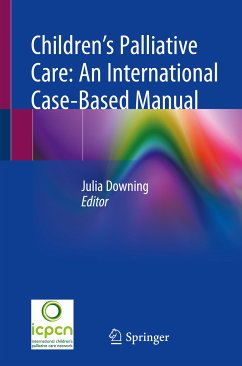This manual enables individuals working in children's palliative care (CPC) globally to learn through engaging real-world cases. The aim is to provide a clinical case-based resource that is globally relevant and accessible to those working in CPC. Drawing on case histories from around the world that reflect key issues and elements of CPC, it provides a practical approach grounded in experience. It addresses multidisciplinary care in the management of children and their families; discusses cases from an international perspective, and shares examples from a variety of countries, utilising cases across a range of ages and conditions, demonstrating holistic care. It represents the first case-based manual on global CPC and is endorsed and promoted by the International Children's Palliative Care Network (ICPCN).
Children's palliative care is a rapidly developing field, both in the UK and internationally. The provision of CPC varies considerably, with provision often being insufficient, and over 65% of countries having no recognised CPC service provision whatsoever. As such, while there are an estimated 21.6 million children who require palliative care, in many areas of the world, CPC is poor or non-existent, and children are treated like little adults without their distinctive needs being recognised or understood. There is also a dearth of literature on CPC, hence this clinical case-based manual fills a gap in the market, and is aimed at a global audience, making it a unique text in the field.
Dieser Download kann aus rechtlichen Gründen nur mit Rechnungsadresse in A, B, BG, CY, CZ, D, DK, EW, E, FIN, F, GR, HR, H, IRL, I, LT, L, LR, M, NL, PL, P, R, S, SLO, SK ausgeliefert werden.
"If you work in paediatric palliative care, you should have this book, as it will make you think about what you do. ... And just before you adult palliative care people switch off, I think this book will make you think about your work - I found myself repeatedly asking similar or parallel questions related to the management of adult patients." (Roger Woodruff, IAHPC Book Reviews, hospicecare.com, Vol. 21 (11), November, 2020)
Es gelten unsere Allgemeinen Geschäftsbedingungen: www.buecher.de/agb
Impressum
www.buecher.de ist ein Internetauftritt der buecher.de internetstores GmbH
Geschäftsführung: Monica Sawhney | Roland Kölbl | Günter Hilger
Sitz der Gesellschaft: Batheyer Straße 115 - 117, 58099 Hagen
Postanschrift: Bürgermeister-Wegele-Str. 12, 86167 Augsburg
Amtsgericht Hagen HRB 13257
Steuernummer: 321/5800/1497
USt-IdNr: DE450055826
Bitte wählen Sie Ihr Anliegen aus.
Rechnungen
Retourenschein anfordern
Bestellstatus
Storno









